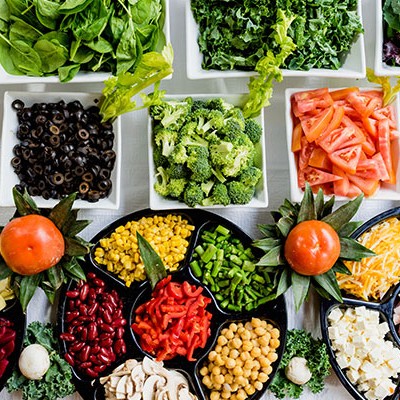Is Sugar Addictive?

What is sugar?
Firstly, sugar is made up of glucose and fructose.
Put them together and you get sucrose, aka table sugar.
So, that’s what we’re dealing with.
But you’d be amazed how many overnight nutritional “experts” point the finger at sugar without even knowing this.
They tell people to have coconut sugar instead which more or less has the same make-up.
Tsk. Tsk.
So, is sugar addictive or not?
This notion came from a few animal studies, but does it translate to humans?
This study investigated if foods containing sugar caused any addiction-like problems that met clinical standards for substance dependence and whether it translated into body weight and depressed mood.
1495 university students were assessed for any signs of food addiction to certain foods.
And what did they find?
- 95% of people experienced at least ONE symptom of food dependence
- 12.6% met the classification for 'food addiction'
- The majority of respondents experienced these problems for combined high-fat savoury (30%) and high-fat sweet (25%) foods (for example, ice cream)
- Only a minority experienced such problems for low-fat/savoury (2%) and mainly sugar-containing foods (5%).
- Overweight correlated only with addictive-like problems for high-fat savoury and high-fat sweet foods, while this was not found for foods mainly containing sugar.
Well, there you go. So why all the fuss?
People got fatter when they had addictions to foods like cake and ice cream (foods with high fat and sugar). But that’s no surprise considering the calorie content.
But was sugar addictive? “This was not found”, they said.

So, to be clear, people weren’t found to be addicted to sugar in this study, and thus they didn’t gain weight from it.
And I’ll add that least from a calorie perspective (and for the 23487th time) carbohydrates (and thus sugar) only has 4 calories per gram whilst fat has nine. So, this is not surprising at all.
So, what did our scientists conclude?
“...sugary foods contribute minimally to 'food dependence' and increased risk of weight gain. Instead, they are consistent with the current scientific notion that food energy density, and the unique individual experience of eating, plays an important role in determining the reward value of food and promoting excessive energy intake.”
Another review tackled this very question about sugar addiction.
In very polite scientific terms, it said that comparing what’s addictive in terms of substances and food is a bit counterproductive. It said that we like sweet foods because they taste good, and not for any other reason.
They then questioned the usefulness of investigating if sugar is ‘addictive’ at all:
“The use of colloquial terminology, such as food or sugar “addiction”, within scientific publications distracts from the purpose of clear, concise, and objective sharing of scientific observations related to the control of food intake.”
So, all the social media nutrition “experts” claiming sugar is addictive need to take their heads out of their smartphones and bury them into scientific journals.
And stop spreading garbage.
Another review tells us:
“We find little evidence to support sugar addiction in humans, and findings from the animal literature suggest that addiction-like behaviours, such as bingeing, occur only in the context of intermittent access to sugar.”
Echoing previous findings, the review went on to say that any addictive-like behaviours likely arise from intermittent access to sweet tasting or highly palatable foods and “not the neurochemical effects of sugar.”
So, sugar is not like drugs. That’s an important takeaway.
Because so often you see people comparing it to an illicit drug like cocaine and that just doesn’t wash in the real world of science.
Despite what you might have read, sugar isn’t a poisonous and addictive substance we need to shy away from.
It’s. Just. Sugar.

The bottom line is that sugar is not addictive
Study subjects who are overweight show an addiction-like desire for foods containing fat and sugar because of their palatability, but not sugar alone. Because sugar is not addictive for overweight subjects it, therefore, doesn’t cause them to be overweight.
So, blaming an obesity epidemic or even people gaining fat on sugar is not founded by science. Enjoy sugar in moderation as you would other foods.
Further Sugar Reading
Enjoyed this article? Check out these complimentary ones...

Dayne Hudson
Like many, Dayne was once desperate to lose weight and get into shape. But everyone he asked, everything he read, lead to the same place... nowhere.
His journey started there - researching science journals and completing a Sports Nutrition Specialist qualification so he could make weight loss easier.
References:
- Horecker BL. The biochemistry of sugars. Int Z VitamErnahrungsforschBeih. 1976;15:1-21. PMID: 182650.
- Asghar MT, Yusof YA, Mokhtar MN, et al. Coconut (Cocos nucifera L.) sap as a potential source of sugar: Antioxidant and nutritional properties. Food Sci Nutr. 2019;8(4):1777-1787. Published 2019 Sep 30. doi:10.1002/fsn3.1191
- Markus CR, Rogers PJ, Brouns F, Schepers R. Eating dependence and weight gain; no human evidence for a 'sugar-addiction' model of overweight. Appetite. 2017 Jul 1;114:64-72. doi: 10.1016/j.appet.2017.03.024. Epub 2017 Mar 19. PMID: 28330706.
- Oh R, Gilani B, Uppaluri KR. Low Carbohydrate Diet. 2021 Jul 12. In: StatPearls [Internet]. Treasure Island (FL): StatPearls Publishing; 2022 Jan–. PMID: 30725769.
- Greenberg D, St Peter JV. Sugars and Sweet Taste: Addictive or Rewarding? Int J Environ Res Public Health. 2021 Sep 17;18(18):9791. doi: 10.3390/ijerph18189791. PMID: 34574716; PMCID: PMC8468293.






























